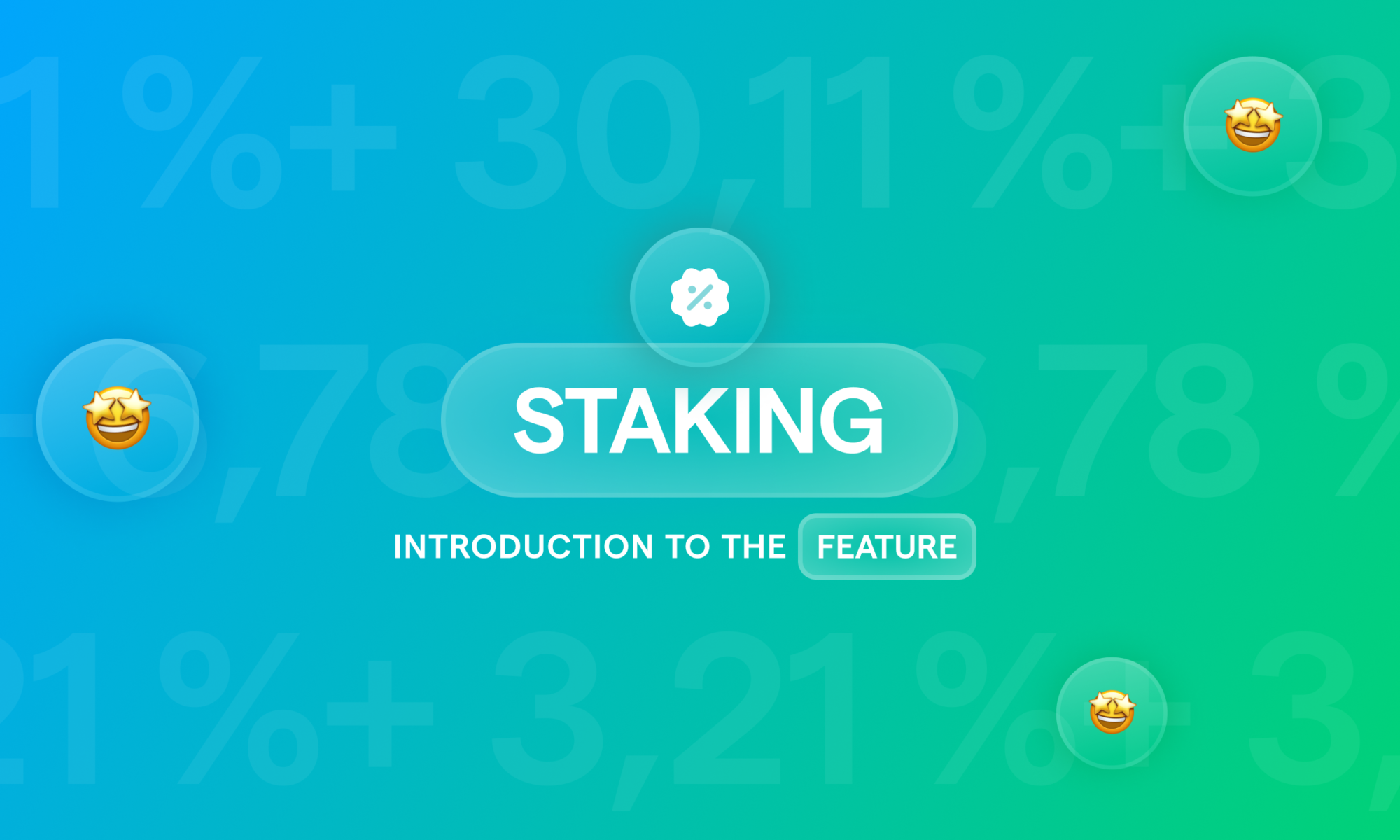Young Platform reopens its Staking functionality: here are all the updates
Young Platform is bringing back one of its most beloved features: staking. Completely revamped with new characteristics and advantages, staking remains one of the easiest ways to make your cryptocurrency holdings grow. Let’s explore the updates together!
Open Account
What is Staking?
Imagine you have a stash of cryptocurrencies. Generally, the value of these holdings doesn’t grow unless you delve into complex trading strategies, which require constant monitoring and can be quite stressful.
In other words, beyond just waiting for market prices to rise, it’s strategic to increase the number of tokens you hold. You could do this through trading or savings schemes, but there’s also a simpler way: staking. Staking allows you to increase the number of tokens in your wallet without selling your assets. This isn’t magic; it’s an inherent feature of how some blockchains work.
Staking exploded in popularity in 2020, particularly in decentralised finance (DeFi), because it offers a relatively simple way to earn cryptocurrency rewards.
Staking is linked to Proof of Stake (PoS) consensus protocols. Forget the powerful miners, costly hardware, and hefty electricity bills to “mine” new coins. With staking, you only need to “lock” your cryptocurrencies within a network and start receiving rewards.
How does Staking work?
Staking transforms the mere possession of cryptocurrencies into something more active and participatory. It’s a way to contribute to the security and efficiency of a blockchain network—and in return, you get rewarded.
Blockchain networks that use the proof-of-stake (PoS) consensus mechanism select validators from those who have staked their cryptocurrencies. These validators are responsible for verifying and confirming transactions and creating new blocks in the blockchain.
In exchange for their contribution, the network rewards these validators with newly minted coins as an incentive to participate and behave honestly. The system generates these coins as part of its protocol, similar to how miners earn cryptocurrency rewards in proof-of-work (PoW) blockchains. This process keeps the network decentralised and secure and distributes new tokens, encouraging active participation.
Discover Young Platform
Advantages of Staking on Exchanges
Ease of Use
Staking protocols aren’t always user-friendly. Most DeFi platforms require technical knowledge, and navigating the maze of decentralised protocols can be challenging for those unfamiliar with the sector. Some centralised exchanges, like Young Platform, have developed solutions that make staking simple and accessible.
Lower budget requirements
The high minimum deposit requirement is one of the biggest obstacles to direct staking. For example, with Ethereum, one of the leading cryptocurrencies, staking directly on the Ethereum network requires a minimum of 32 ETH. With the current price of ETH around €2,000, that’s an initial deposit of approximately €64,000—not exactly pocket change.
This is where centralised and decentralised platforms come in. With services like those offered by Young Platform, you can start staking with a minimum of about €50 at current rates, making staking accessible for those with significant capital and those looking to start with a more modest amount.
Flexibility
You can cancel your staking at any time, provided that the platform allows it, giving you the freedom to manage your cryptocurrencies as you see fit.
Staking on Young Platform
Young Platform offers two types of staking: Liquid Staking and Proof of Stake, which can be used simultaneously. This allows you to diversify your portfolio and maximise reward opportunities across multiple blockchain networks.
Rewards are calculated through the APY (Annual Percentage Yield), which represents the net annual return. The APY shows the percentage of new tokens you can accumulate over 12 months, which is gross of the applied fees.
You can also create multiple stakes on available cryptocurrencies. You can create a new stake whenever you purchase or deposit new cryptocurrencies. In the “Stake History” section of the platform, you can track all the details: rewards generated, time elapsed since each stake was activated, and their value in euros.
When you create a new stake, you can see potential rewards and their equivalent value at the current price. This tool allows you to perform simulations and estimates, helping you plan your actions to meet your long-term goals.
Liquid Staking – Ethereum (ETH)
Liquid Staking allows you to stake your tokens while maintaining liquidity, making it ideal for those seeking greater agility. On Young Platform, this option is available for Ethereum (ETH) through the provider Lido.
With Lido, staking is managed directly on behalf of the user. Lido handles the staking, manages nodes, and distributes rewards. This process adheres to network activation and deactivation queues, ensuring that users can participate without having to directly manage nodes.
- Asset: Ethereum (ETH)
- Provider: Lido
- APY: Lido provides the APY, which is calculated as an average over the last 30 days. The displayed APY is the gross of the applied fees.
- Reward Currency: ETH
- Compound Interest: Rewards are automatically reinvested into staking, increasing your total balance over time.
- Minimum Amount: 0.02 ETH (use the Ethereum Converter to calculate the current value)
- First Reward Credit: Approximately 1 day. This timing may vary depending on network conditions.
- Reward Credit Frequency: Rewards are credited daily.
Thanks to Liquid Staking with Lido, you don’t need to worry about the complexities of node management. Lido takes care of everything, from managing nodes to distributing rewards, allowing you to participate in Ethereum staking without technical barriers. Moreover, you benefit from compound interest, which grows your balance over time.
Compound interest in staking works like a snowball effect: the longer you keep your cryptocurrencies staked, the greater the potential rewards accumulated. This approach rewards patience and consistency, making staking not only a strategy for immediate rewards but also a method to steadily increase your portfolio’s value over time.
However, it’s important to remember that past returns do not guarantee future results, and the value of cryptocurrencies and staking rewards can fluctuate.
Proof of Stake – Solana (SOL)
Proof of Stake (PoS) on Young Platform will soon be available for Solana (SOL) through the provider Fireblocks. This model selects validators based on the amount of tokens locked in the network. The more tokens you lock, the higher your chances of being selected as a validator and earning rewards.
- Asset: Solana (SOL)
- Provider: Fireblocks
- APY: The APY is the rate the network recognises for validators at that moment. The displayed APY is the gross of the applied fees.
- Reward Currency: SOL
- Compound Interest: Rewards are automatically reinvested into staking, increasing your total balance over time.
- Minimum Amount: 0.3 SOL (use the Solana Converter to calculate the current value)
- First Reward Credit: Approximately 4 days
- Reward Credit Frequency: Rewards are credited every 2-3 days, depending on network conditions.
The network distributes the rewards for Solana at the end of each “epoch.” An epoch lasts, on average, about 2.5 days, which is 60 hours. However, this period is not fixed and can vary depending on the state of the blockchain. For example, if the network is congested, the duration of an epoch may be longer. In any case, the minimum duration is 60 hours.
It is important to note that you must wait for two epochs to receive the first reward after staking SOL. This means it takes at least 96 hours (4 days) to receive the first reward.
Solana’s Proof of Stake is ideal for those who prefer a more traditional staking option. Unlike liquid staking, rewards here do not take advantage of compound interest, but you can still accumulate new SOL by actively participating in the network.
Proof of Stake – Cosmos (ATOM)
Thanks to the collaboration with the provider Kiln, the Proof of Stake (PoS) on Young Platform is available for Cosmos (ATOM). This system allows you to actively contribute to the security of the blockchain network by staking your ATOM and automatically earning periodic rewards.
- Asset: Cosmos (ATOM)
- Provider: Kiln
- APY: Approximately 18%. The annual percentage yield (APY) corresponds to the rate at which the network grants validators at that specific moment. The APY is also gross of the applicable fees.
- Reward currency: ATOM
- Compound interest: Rewards are automatically reinvested into staking, increasing your total balance over time.
- Minimum amount: 10 ATOM
- First reward credit: 1 day
- Reward frequency: 1 day
Proof of Stake – Celestia (TIA)
Young Platform also offers Proof of Stake (PoS) for Celestia (TIA) in collaboration with the provider Kiln. With this system, you can put your TIA to work to support the blockchain network and earn rewards simply and automatically.
- Asset: Celestia (TIA)
- Provider: Kiln
- APY: Approximately 9%
- Reward currency: TIA
- Compound interest: Rewards are automatically reinvested into staking, increasing your total balance over time.
- Minimum amount: 10 TIA
- First reward credit: 1 day
Reward frequency: 1 day
Extra benefits for Young Platform Club members
For members of a Young Platform Club, an exciting new feature makes staking even more advantageous. Alongside receiving rewards in the cryptocurrency you’ve staked, like Ethereum (ETH), you’re also entitled to an additional APY in YNG tokens. This means you will receive the cryptocurrency you staked and a second reward in YNG tokens for every stake activated.
This dual benefit furthers the value of your portfolio, ensuring greater diversification and potentially better results over time. Club members can thus maximise staking returns, taking advantage of rewards in two different assets with each operation.
Ready to Take Action?
Check out the guide for activating staking on Young Platform and start putting your crypto to work today!
Related Articles:
- Guide to Activating Staking on Young Platform
- Guide: creating new stakes for adding funds to existing ones
- Staking returns on Young Platform
- Club Benefits for Staking on Young Platform
- Guide: Closing a Stake

Important Notice
Staking, like any operation involving cryptocurrencies, comes with risks. The value of cryptocurrencies can fluctuate, and staking rewards are not guaranteed. Past returns do not indicate future outcomes and staking rewards can vary depending on factors such as the specific cryptocurrency protocol, the number of validators, and market conditions. It’s crucial to conduct thorough research and fully understand staking mechanisms before proceeding. Young Platform is committed to providing clear and transparent information but cannot be held responsible for any losses or damages resulting from the use of staking services. Users acknowledge that potential risks and/or attacks on one or more blockchain


